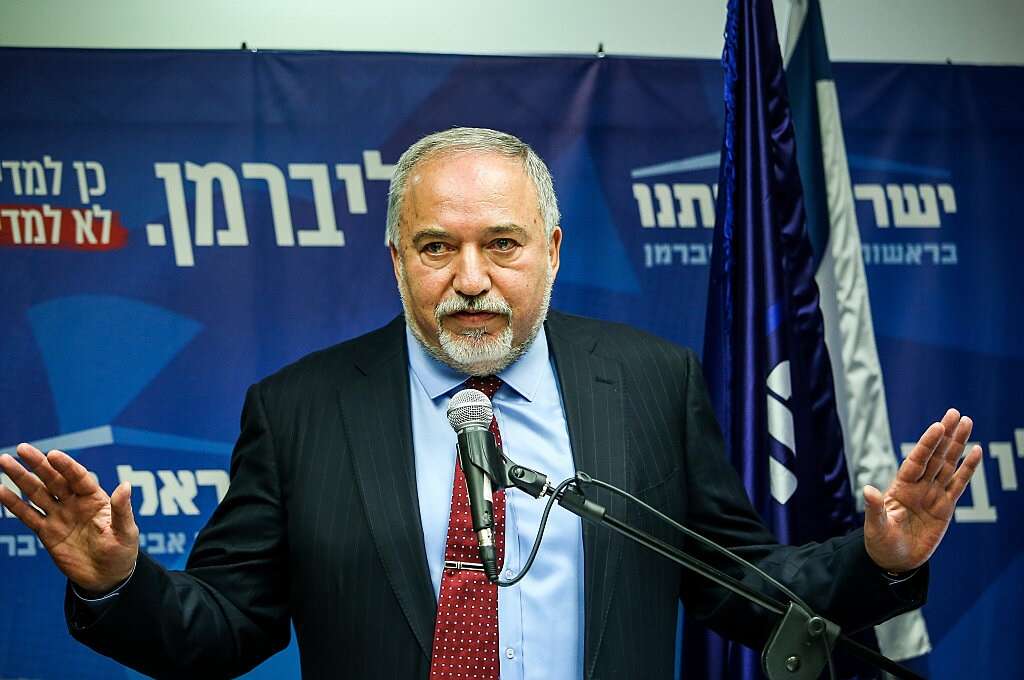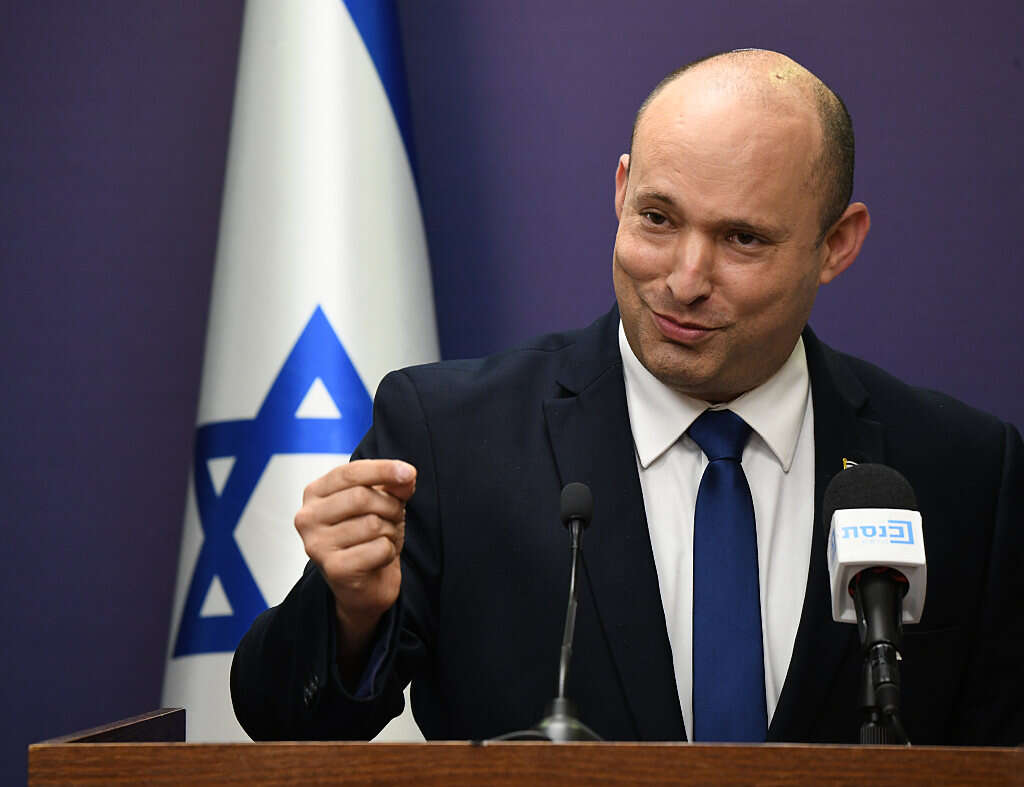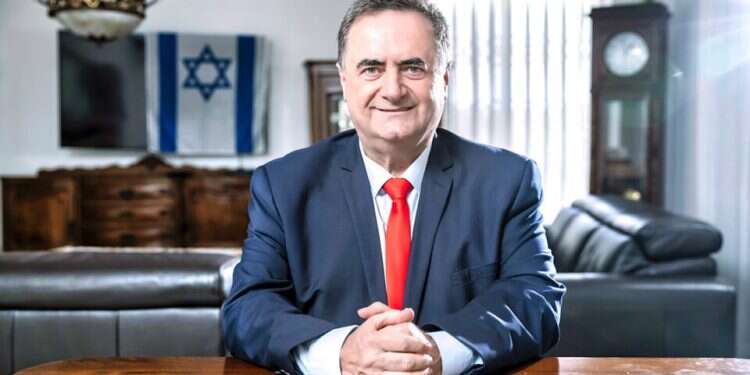Israel Katz was promoted to the role of Finance Minister during an especially challenging year – three months after the outbreak of corona. Beforehand, he was Minister of Transport for a total of nearly a decade.
Follow Israel Hayom on Facebook and Twitter
He opened the interview in his home in Kfar Ahim himself, before I had asked a single question, with a monologue about ports, his vision for a rail system that will ultimately connect Israel to the countries of the Middle East, and the road network which he developed. "Not a single official believed in it. They even proved to me that a new port wasn't needed, but I pushed it in the style of Herod."
Q: Do you still compare yourself to Herod?
"I am more than Herod. Herod built Caesarea so that Israel would become a center of international trade, but he didn't succeed. Israel has a historic role because of its location, and I succeeded in doing it, without the committees ruining the plans. I stood firm in a great struggle against threats and pressure. It was the only reform that took place without the approval of the Histradut [labor federation].
"I leveraged the 2011 protests. I said to [then-Histadrut head] Ofer Eini – you can protest inside the ports, but if you expand the protest from there, we will pass a 'Mandatory Arbitration Act.' He was shocked by this. At the start we received an injunction from the Labor Court, but after I took the stand, they reversed their decision. It's a historical revolution, like the 'Open Skies' agreement. Netanyahu dreamed about it but didn't succeed in carrying it out. I made it happen."
Q: Netanyahu wasn't part of it?
"Oh, yes, of course. He supported me."
It is not clear why Katz insists on comparing himself to such a controversial king of Judea, who the Jews didn't see as a legitimate Jew and the Christians saw as an enemy, but it's clear that Katz places himself on the high pedestal of someone who wants to be seen as the next prime minister, or at least the leader of the Likud. And no, he doesn't intend to challenge Netanyahu: "As long as he is part of Likud I won't stand against him, but the day after – I will be elected."

Q: How can you be so sure about this? There are other potential candidates.
"I was elected in the highest position in every Likud primary. I am really connected to the grassroots. I was always in Likud and I will always be in Likud. And in the end, Likudniks choose a Likudnik as the leader of the party."
Q: There's also Nir Barkat.
"He isn't a Likudnik," Katz says of the former mayor of Jerusalem.
Q: Other candidates could suddenly appear.
"I won't have more contenders. Whoever wants to run should say so now, while we're in the opposition. I won't shorten the minimum time for anyone."
The Grants Error
We will return to politics, but for Katz it's very important to talk about transport. I ask him if developing the roads hadn't become a problem, because, ultimately, it's clear that the only solution is public transport. The conversation is interrupted by a call from our photographer, who had reached Kiryat Malachi – Yoav Train Station. Katz smiles and says: "You see, I built that station. In 2018, I decided that it would stop there."
Q: It seems you haven't succeeded in moving on from your time as transportation minister.
"Developing the trains and the roads is part of my ideology of developing the periphery, just like the Open Skies. Before only rich people flew overseas, but before corona five million people flew every year, that's nearly everyone who can fly, it's everyone.
"The ports are also part of this ideology, including the struggle against monopolies. Look – now the Minister of Transport Merav Michaeli has invited me to the port's opening ceremony, she knows that I did it. At the time, Labor and Meretz – and not only them – opposed me. Lapid gave his approval in retrospect, and so when he was in opposition I invited him to the ceremony at the port, because he didn't block the project."
Q: Looking back at your time as finance minister, how much do you regret the furlough plan?
"The unpaid leave program provided security and certainty. You have to remember that the expectation was that corona was going to disappear, but it returned in the middle of June. I understood that we weren't playing the right game. Note that fewer businesses closed and at the end of June the unpaid leave ended."
Q: You say that fewer businesses closed, but the question is why. Maybe because they waited for grants?
"I read the research by the employment service. It's nonsense. How can anyone not agree with the furlough scheme? The country has no other model. To me it doesn't matter if it's a German or Israeli model, the important thing is to support the people. The state can't close businesses and not take responsibility."
Q: You once said that it was a marginal phenomenon, but we see that workers really aren't returning to their places of work.
"The problem is with the low-wage earners. It's not connected to the furlough scheme. When they were at home, they recalculated things. I gave them an incentive to return to work and an incentive to absorb unemployed veterans and an incentive to employers and for professional training. So I built a reduced employment branch at the ministry."
Q: And Lieberman has just closed that branch.
"It's a mistake to close it, because in the Ministry of the Economy this branch didn't do anything. We worked with the Israel Innovation Authority, which is a good branch [in the Ministry of the Economy], so that they would receive the average wage in the economy throughout their training."
Q: Where do you stand on the demand of the Tax Authority for grants which didn't meet the criteria to be returned?
"It's a mistake. They are taking from people who exceeded two percent of the criteria, or all types of unique cases. After all, people are afraid to confront the tax authorities, and therefore they will be forced to return what is required of them, but it's the role of the finance minister to defend them, and he's not functioning. They received grants according to criteria that were known to them, and in most of the cases, we're talking about business owners with a turnover of up to NIS 300,000 [$93,000]. You don't need to take from them, it's clear that they've suffered."

Q: What's your opinion about the role of the Finance Ministry?
"The finance ministry presents very impressive numbers. Growth wasn't harmed like we feared, the debt increased far less than expected, the credit rating wasn't damaged. But these are all impressive numbers that he received from me. The ministry didn't have time to prepare all of the reforms and the programs, he based them on my contingency plans. I classified all of the suggestions which arose according to color. Everything which received a red classification, from my perspective, that said it belongs in storage, now the officials pulled it out and he has adopted the plans. He has imposed taxes that should not be raised."
"What's a tax on single-use plastics? If it's not a tax, why has the finance ministry calculated how much revenue it will bring to the state's treasury based on current consumption? They are aware that it won't lead to a reduction in consumption, so it's a tax! And a congestion charge is a tax in every way. As long as the public transport plan isn't implemented and there's no good alternative to public transportation – it's simply a tax.
"The agriculture reform will lead to the collapse of agriculture" he continued. "The farmers work hard. I'm not saying that we don't need to move to direct support, but we need to talk to them, and not to make life easy and to set a uniform criterion for direct support. I wanted to do it, but in dialogue. He does everything aggressively. Lieberman says there are a total of 7,000 farmers, but he doesn't understand what a farmer is. Each one of them is a factory, it's like closing 7,000 factories."
Q: So you're not impressed by his performance.
"Lieberman is dangerous for Israel. He's amassing power, here there is no prime minister, each minister a law unto themselves, and it's dangerous that this person, who is superficial and doesn't go deep into anything, has a lot of power. Bennett has no decision-making ability; Lieberman makes decisions with finance ministry officials without understanding their significance. A minister needs to have a worldview that goes beyond the consideration of his officials."
Q: With this power, he will succeed in passing a budget.
"We had a budget that was ready. We wanted to pass a budget for 2021 and Benny Gantz didn't want to. He wanted to secure the existence of the rotation agreement and insisted on a two-year budget, which wasn't appropriate for the corona period. In any case, we stuck to the framework of the budget. Lieberman already pulled a trick when he changed his inflation forecast from the current one to a predicted one. This trick allowed him to deviate by a few billion shekels. He is raising taxes, he's not meeting his obligations to the disabled, but he closes the pensions of career soldiers without a thought."
Q: What do you see as problematic in the decision-making of Finance Ministry officials?
"They threw the budget for the metro from the Arrangements Law, they are canceling the light rail from Nazareth to Haifa, they are canceling the train to Eilat. They say that they are 'delaying implementation because they don't know how to implement. We're talking about huge sums of public money invested in these projects, and they are leaving the infrastructure in billions buried in the ground.
"As a rule, the officials support mass transit projects, but in practice they only delay, and it's easy for the current finance minister, because he's not really involved and he doesn't have a worldview, and it's one less expense in the budget. I absorbed 600 doctors, I signed agreements with hospital chiefs, even with the officials claiming that I was exceeding my authority. I solved the conflict with the social workers and the disabled. Now the finance ministry is provoking everyone."

Q: Lieberman is implementing a liberal way of thinking. It's also your approach.
"My worldview is a free market with social sensitivity. It's not right to meet the people in rehabilitation. You have to invest in prevention."
Q: And it also suits the approach of the previous prime minister?
"Correct. There's no doubt that Netanyahu's greatest strength is the economic side. His decade in the finance ministry brought great achievements for the State of Israel and we've been reaping the benefits of them until today. Netanyahu also takes a hard line on issues of health, and that's what saved us during this epidemic. He immediately took a hard line and he was the first to get his hands on the vaccinations. He didn't have to worry about me in every role which I filled, because I work independently and I know how to implement."
Q: You clearly respect Netanyahu, but you stick to measured compliments. Do you think that he is an exceptional leader? Maybe the only one of his generation?
"I don't use expressions like that."
Q: Do you also share the view that Netanyahu is the one holding the current government together, and that when he quits, it might help the right-wing to return to power?
"The public presence of Netanyahu contributes to the status of the opposition. He is a leading figure who has status in Israel and around the world. If he decides to continue, I welcome it. He was also elected as the Likud chairman and he is our candidate. It's true that after he himself offered the premiership to Bennett, Gantz, and Sa'ar, I asked him to allow the Likud to choose a replacement, and that he would return to the role a year later. We could have worked together, it was the opportunity, but it didn't happen.
"The day Netanyahu departs, I am convinced that I will be chosen as Likud leader. It's clear that Netanyahu leads, and I'm not going to challenge him. I'm the Likud Chairman of the Secretariat and I enjoy broad support after I was elected in second place. Likud has only had four leaders. It's not people coming and going like it is with other parties. It's a strong movement."
What Bennett missed
Q: How do you rate the current government's chance of survival?
"Bennett stole the position. He's in an unstable government that relies on anti-Zionist Arabs. So now our mission isn't elections but replacing the government in the current Knesset. As long as this government fails to deliver and to lead – it will increase the chance of it happening."
Q: Are you steadfast in your view of the Prime Minister?
"He is a liar and I don't expect the media to say it."
Q: Do you think that he changed his mind after the elections, or that he lied from the start?
"Of course he lied. Despite his proclamation, he is sitting in a government with the leader of the Islamic Movement, whose deputy, Sheikh Hamed, who was selected as chairman of the southern branch of the Islamic Movement in Israel, wrote that the Taliban takeover of Afghanistan signals what is going to happen to every Western government, including Israel."
Q: What's your view of Bennett's visit to Washington?
"He didn't achieve anything there. He quotes what Biden said about Iran, which is a weaker statement on the issue than any of the previous presidents. Even Obama said that he was preparing a military option, which Biden didn't mention at all.
Subscribe to Israel Hayom's daily newsletter and never miss our top stories!
"Trump deployed economic pressure and canceled the [nuclear] agreement. If he had been elected again, the Iranians would already have folded. Now instead of pursuing them, they're pursuing the Americans. There's a wide gap between the Israeli and American positions – Israel adopted the Begin Doctrine, which says that it won't allow extremist countries to obtain weapons of mass destruction. It's clear that, if necessary, we will act alone, and therefore it's very important that there will be global agreement. The discussions about the visas are very nice, but it won't work against the Iranian threat."




